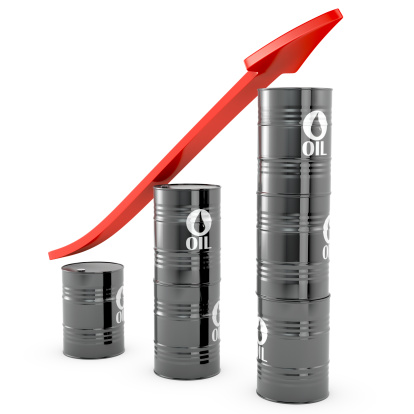
The benchmark crude oil used to set prices for about half the world’s oil topped $70 a barrel in London on Thursday for the first time since December 2014. Brent crude for March delivery traded at $70.05 a barrel before falling back.
West Texas Intermediate (WTI) crude, the benchmark price for U.S. and Canadian crude oil, traded at a high of $65.53 on the NYMEX. The difference between the Brent and WTI prices (called the “spread”) of about $5.50 is about a dollar lower than it was last week.
That means that as fast as the price of Brent is rising, WTI prices are rising even more quickly. In the United States, this increase is unusual for this time of year and U.S. drivers are seeing the effect of higher WTI prices on the price they’re paying at the pump.
According to AAA, the current average U.S. price for a gallon of regular gasoline is nearly $2.51, up more than two cents since Wednesday and nearly three cents higher in the past month. A month ago a gallon of regular gasoline cost $2.46, and a year ago the price was about $2.36.
The higher U.S. prices are driven by continued declines in the amount of crude oil in the nation’s commercial stockpiles. Compared to year-ago inventory levels, U.S. commercial crude oil stockpiles have dropped 8.1%, down nearly 95 million barrels.
Total gasoline stockpiles have fallen by 1.3% in the past year to 240.5 million barrels, and the total commercial stockpile of all petroleum goods — crude oil and all manner of refined products — was 1.335 billion barrels at the end of last week, a drop of 8.7% over the past 12 months.
There is some reason to believe that the success of the production cuts imposed last year by OPEC and its non-cartel partners — particularly Russia — may open the gates for U.S. producers to expand their capital budgets and drill more.
Domestic crude production is up 6% year over year to about 9.5 million barrels a day, and that number is expected to rise to around average around 10 million barrels a day this year and should reach that level in the next month or two. Whether that happens depends on how quickly U.S. oil exploration and production companies can ramp up more drilling.
Political issues in Iran and Venezuela also could push crude prices higher.
A Reuters survey of industry professionals resulted in an average Brent crude price of $65 a barrel for 2018, rising to a range of $65 to $70 a barrel in 2019, and topping out at $70 a barrel in 2020. Less than 5% of respondents see crude averaging less than $55 a barrel in either 2018 or 2019. A similarly small percentage expects 2018 prices to average more than $75 and 2019 prices to average more than $85 a barrel.
In the United States, refinery maintenance and turnaround to producing summer-grade fuel begins next month. This traditionally causes pump prices to rise as refinery output declines. Then in May, prices go up because summer-grade gasoline is more expensive to refine and the summer driving season begins and demand for gasoline typically rises.
The long and the short of it is that the pump prices Americans are paying today are about as low as gas prices will be until after Labor Day.
Get Ready To Retire (Sponsored)
Start by taking a quick retirement quiz from SmartAsset that will match you with up to 3 financial advisors that serve your area and beyond in 5 minutes, or less.
Each advisor has been vetted by SmartAsset and is held to a fiduciary standard to act in your best interests.
Here’s how it works:
1. Answer SmartAsset advisor match quiz
2. Review your pre-screened matches at your leisure. Check out the advisors’ profiles.
3. Speak with advisors at no cost to you. Have an introductory call on the phone or introduction in person and choose whom to work with in the future
Thank you for reading! Have some feedback for us?
Contact the 24/7 Wall St. editorial team.




